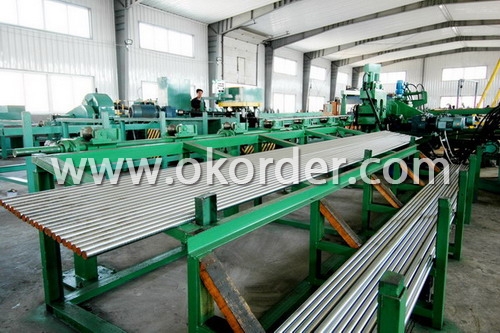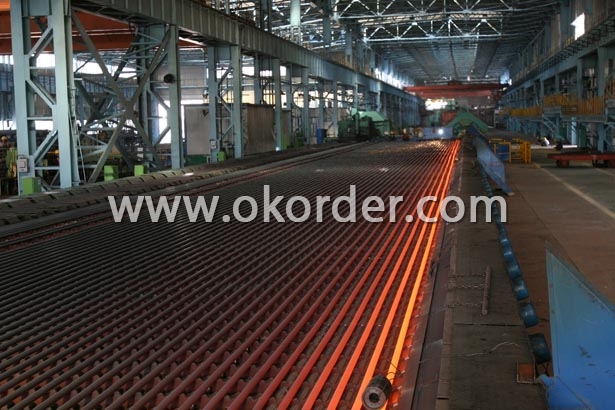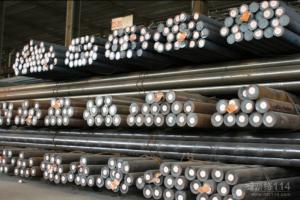Alloy Steel Ball Bearing Special Steel
- Loading Port:
- China Main Port
- Payment Terms:
- TT or LC
- Min Order Qty:
- -
- Supply Capability:
- -
OKorder Service Pledge
OKorder Financial Service
You Might Also Like
Product Description:
OKorder is offering Bearing Steelsat great prices with worldwide shipping. Our supplier is a world-class manufacturer of steel, with our products utilized the world over. OKorder annually supplies products to European, North American and Asian markets. We provide quotations within 24 hours of receiving an inquiry and guarantee competitive prices.
Product Applications:
Bearing steels are used for ball and roller bearing applications and are comprised of low carbon steels and high carbon through harden able steel.First the famous 1C-1.5Cr steel from which the majority of bearings are made. Its structure is apparently well-understood and the focus is on purity in order to avoid inclusions which initiate fatigue during rolling contact. Then there is the M50 steel and its variants, from which bearings which serve at slightly higher temperatures in aeroengines are manufactured, based on secondary-hardened martensite.
Tapered roller bearing are generally used to support combined load mainly consisting of radial load. Their cups are separable for easy assembling ,During mounting and using, radial clearance and axial clearance can be adjusted and preloaded mounting can be made.
.
Product Advantages:
OKorder's Bearing Steels are durable, strong, and resist corrosion.
Main Product Features:
· Premium quality
· Prompt delivery & seaworthy packing (30 days after receiving deposit)
· Corrosion resistance
· Can be recycled and reused
· Mill test certification
· Professional Service
· Competitive pricing
Product Specifications:
Manufacture: Hot rolled
Grade: Q195 – 235
Certificates: ISO, SGS, BV, CIQ
Length: 6m – 12m, as per customer request
Packaging: Export packing, nude packing, bundled
FAQ:
Q1: Why buy Materials & Equipment from OKorder.com?
A1: All products offered byOKorder.com are carefully selected from China's most reliable manufacturing enterprises. Through its ISO certifications, OKorder.com adheres to the highest standards and a commitment to supply chain safety and customer satisfaction.
Q2: How do we guarantee the quality of our products?
A2: We have established an advanced quality management system which conducts strict quality tests at every step, from raw materials to the final product. At the same time, we provide extensive follow-up service assurances as required.
Q3: How soon can we receive the product after purchase?
A3: Within three days of placing an order, we will begin production. The specific shipping date is dependent upon international and government factors, but is typically 7 to 10 workdays.
Images:


- Q:What are the challenges in welding special steel?
- One of the main challenges in welding special steel is its high carbon content, which can result in increased hardness and brittleness. This requires careful control of the welding process, including preheating and post-weld heat treatment, to prevent cracking and ensure proper weld strength. Additionally, special steels often have alloying elements that can influence the weldability, such as chromium, nickel, or molybdenum, requiring specific filler materials and welding techniques. Overall, the challenges in welding special steel lie in achieving a strong and defect-free weld while maintaining the desired mechanical properties of the steel.
- Q:What are the common challenges in welding special steel?
- Welding special steel can present several challenges that differ from welding regular carbon steel. Some common challenges in welding special steel include: 1. High carbon content: Special steels often have a high carbon content, which can lead to increased hardness and brittleness. This can make it more difficult to achieve a proper weld without experiencing cracking or other defects. 2. High alloy content: Special steels often contain various alloying elements, such as chromium, nickel, or molybdenum, which can impact the weldability. These elements can introduce complexities, such as increased susceptibility to heat-affected zone (HAZ) cracking or the formation of brittle phases. 3. Heat sensitivity: Special steels are often more sensitive to heat input during welding. Excessive heat input can result in grain growth, reduced mechanical properties, or distortion of the welded structure. Therefore, careful control of heat input and preheating techniques may be necessary. 4. Pre-weld and post-weld treatments: Special steels may require specific pre-weld and post-weld treatments to ensure proper weld quality and performance. These treatments can include preheating, stress relieving, or post-weld heat treatment. Failure to follow these procedures can lead to the development of residual stresses or reduced mechanical properties. 5. Joint design and fit-up: The design and fit-up of the weld joint can also pose challenges. Special steels may require specific joint configurations, such as a double-V or double-U groove, to ensure proper penetration and fusion. Additionally, tight tolerances may be necessary to maintain the desired mechanical properties of the welded structure. 6. Welding process selection: The choice of welding process can greatly impact the success of welding special steel. Some processes, such as TIG or laser welding, may be more suitable for welding high-alloy steels, while others like MIG or submerged arc welding may be better suited for specific applications. Selecting the appropriate welding process is crucial to achieving a sound weld with the desired properties. To overcome these challenges, it is essential to have a thorough understanding of the specific type of special steel being welded and to follow proper welding procedures and techniques. This may involve conducting pre-weld qualification tests, employing suitable welding consumables, and ensuring proper heat control throughout the welding process. Additionally, working with experienced welders and seeking guidance from experts in special steel welding can help overcome these challenges effectively.
- Q:What are the different applications of tool special steel?
- Tool special steel has various applications across industries such as automotive, aerospace, construction, and manufacturing. It is commonly used for making cutting tools, dies, molds, and components that require high strength, durability, and resistance to wear and corrosion. Additionally, tool special steel finds use in power transmission systems, machine parts, and even surgical instruments. Its versatility and ability to withstand extreme conditions make it a crucial material in many applications where precision and reliability are paramount.
- Q:What are the limitations of using special steel in electrical applications?
- Using special steel in electrical applications comes with several limitations. Firstly, it tends to be more expensive compared to other commonly used materials like copper or aluminum, making it less cost-effective for large-scale projects. Another drawback is its relatively high electrical resistivity, which hampers its efficiency in conducting electricity. This results in higher energy losses and lower overall efficiency in electrical systems, which is particularly concerning for energy-efficient applications like power generation or transmission. Moreover, special steel lacks the malleability and ductility found in materials like copper, making it less suitable for applications requiring shaping or forming. Working with it can be more challenging and may necessitate complex manufacturing processes. Furthermore, special steel is more susceptible to corrosion compared to materials like copper or aluminum. In environments with high humidity or moisture exposure, this can significantly limit its use in electrical applications. Corrosion not only degrades the steel's electrical properties but also reduces its lifespan, leading to increased maintenance and replacement costs. Lastly, special steel may not be as readily available or easily sourced as other materials commonly used in electrical applications. This can present challenges in terms of availability, lead times, and potential disruptions in the supply chain, ultimately impacting project timelines and overall productivity.
- Q:What are the main applications of special steel in the packaging machinery?
- Special steel is widely used in packaging machinery due to its outstanding properties such as high strength, corrosion resistance, and durability. It is primarily utilized in the construction of machine components like blades, dies, and molds, ensuring efficient and precise cutting, shaping, and forming of packaging materials. Additionally, special steel's ability to withstand high temperatures and extreme pressures make it suitable for applications requiring heat sealing or sterilization of packaging. Overall, special steel plays a crucial role in enhancing the performance, reliability, and longevity of packaging machinery.
- Q:How does special steel perform under low temperatures?
- Special steel generally performs well under low temperatures. It has good toughness and ductility, which allows it to withstand cold temperatures without becoming brittle or losing its structural integrity. This makes it suitable for various applications in industries such as aerospace, oil and gas, and automotive, where low-temperature environments are encountered.
- Q:How is special steel used in the manufacturing of machinery?
- Special steel is used in the manufacturing of machinery due to its unique properties and characteristics. It provides exceptional strength, durability, and resistance to wear and corrosion, making it suitable for critical components such as gears, shafts, bearings, and cutting tools. Special steel also allows for precise machining and shaping, enabling the production of complex machine parts. Overall, special steel enhances the performance and reliability of machinery, ensuring efficient and long-lasting operation.
- Q:What are the main applications of special steel in the food processing machinery?
- Special steel is commonly used in various applications in food processing machinery due to its unique properties. One of the main applications is in the production of cutting blades and knives, where special steel's high hardness and excellent wear resistance ensure efficient and precise cutting of food products. Additionally, special steel is utilized in the manufacture of components like shafts, gears, and bearings, thanks to its exceptional strength, corrosion resistance, and ability to withstand extreme temperatures. These properties make special steel ideal for ensuring the durability, hygiene, and safety of food processing machinery, ultimately contributing to the efficient production of high-quality food products.
- Q:How is HSLA steel used in the construction industry?
- HSLA (High-Strength Low-Alloy) steel is commonly used in the construction industry for various applications. It offers increased strength, durability, and better resistance to corrosion compared to conventional carbon steel. HSLA steel is used in the construction of bridges, buildings, pipelines, and other structures where high strength and reliability are required. Additionally, it can be found in structural components like beams, columns, and trusses, as well as in reinforcement bars and plates. Overall, HSLA steel plays a crucial role in enhancing the safety, longevity, and overall performance of construction projects.
- Q:How does special steel contribute to the manufacturing of cutting blades?
- Special steel plays a crucial role in the manufacturing of cutting blades. Cutting blades are required to have exceptional strength, durability, and sharpness to efficiently perform their function. Special steel, also known as tool steel, possesses unique properties that make it an ideal material for manufacturing cutting blades. Firstly, special steel has excellent hardness, which enables cutting blades to maintain their sharpness for an extended period. Cutting blades made from special steel can withstand the wear and tear that occurs during cutting operations. This hardness allows the blades to retain their cutting edge, resulting in a longer lifespan and improved cutting performance. Moreover, special steel offers exceptional toughness, which is crucial for cutting blades. During cutting operations, blades are subjected to high impact and stress. Special steel's toughness helps absorb these forces and prevents the blades from breaking or chipping. This ensures that the cutting blades can withstand demanding cutting tasks without compromising their performance. Additionally, special steel provides excellent corrosion resistance. Cutting blades often come into contact with various materials, including moisture and chemicals. The corrosion resistance of special steel prevents the blades from rusting or corroding, ensuring their longevity and reducing the need for frequent replacements. Furthermore, special steel offers good machinability, making it easier to shape and form into the desired blade design. This enhances the manufacturing process by enabling the production of cutting blades with complex shapes and intricate features. The machinability of special steel allows manufacturers to create blades with precise cutting edges and optimal geometries, resulting in superior cutting performance. In conclusion, special steel contributes significantly to the manufacturing of cutting blades by providing hardness, toughness, corrosion resistance, and good machinability. These properties ensure that cutting blades made from special steel are long-lasting, durable, and capable of delivering exceptional cutting performance in various applications.
1. Manufacturer Overview |
|
|---|---|
| Location | |
| Year Established | |
| Annual Output Value | |
| Main Markets | |
| Company Certifications | |
2. Manufacturer Certificates |
|
|---|---|
| a) Certification Name | |
| Range | |
| Reference | |
| Validity Period | |
3. Manufacturer Capability |
|
|---|---|
| a)Trade Capacity | |
| Nearest Port | |
| Export Percentage | |
| No.of Employees in Trade Department | |
| Language Spoken: | |
| b)Factory Information | |
| Factory Size: | |
| No. of Production Lines | |
| Contract Manufacturing | |
| Product Price Range | |
Send your message to us
Alloy Steel Ball Bearing Special Steel
- Loading Port:
- China Main Port
- Payment Terms:
- TT or LC
- Min Order Qty:
- -
- Supply Capability:
- -
OKorder Service Pledge
OKorder Financial Service
Similar products
New products
Hot products
Related keywords






























